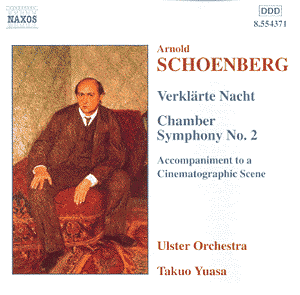 |
|
SCHOENBERG:
Chamber Symphony no. 2
Accompaniment to a Film Scene
Verklärte Nacht
 Ulster Orchestra Takuo Yuasa Ulster Orchestra Takuo Yuasa
 Naxos 8.554371 (60
minutes) Naxos 8.554371 (60
minutes)
Crotchet
Amazon
UK
Amazon
USA

Anyone who believes that Schoenberg is approachable only for the specialist
listener should hear this disc. All three works bear eloquent testimony to
the composer's warm romanticism, but only one of them - the celebrated
Verklärte Nacht (1899) - was written during the earlier part of his
career.
The Chamber Symphony no. 2, which is placed first in the programme, is a
real revelation. Schoenberg began work on the score as early as 1906, then
put it to one side, only returning to complete it more than thirty years
later. in 1939. There are two movements, the first of them slow and richly
expressive, the second more lively and more intense. The orchestration has
abundant interest, and its approach is strongly connected with the music's
fundamental characteristics: strings dominate the first movement, winds and
brass are more prominent in the second. In all, it is a most effective piece.
The performance by the Ulster Orchestra and Takuo Yuasa serves the music
well, and so does the beautifully balanced Naxos recording.
The Accompaniment to a Film Scene (1930) is not quite what its title implies,
since Schoenberg composed it with an imaginary scene in mind, rather than
as part of a film music project. He envisaged music for three emotional states
- Threatening danger, Fear and Catastrophe - so it is no surprise that the
music has that expressionist quality which had first appeared twenty years
before in the monodrama Erwartung. Again the performance is keenly focused,
the recording clear.
The best known of these three pieces is Verklärte Nacht (Transfigured
Night), for string orchestra. Yuasa plays the 1943 revision of the 1917
orchestration of the original string sextet version. The sound world of this
music is subtle, and one advantage of this recording is that it maintains
a real sense of intimacy. But there is ardour too, developing a sweep of
momentum that carries the listener along. The recording is one of Naxos's
best, with a pleasing sense of space and warmth, which is so important a
consideration in music for strings. The music relates to a poem by Richard
Dehmel, in which a woman tells her lover that she has conceived another man's
child. He accepts her, and through their love the night becomes transfigured.
The CD booklet helpfully prints this poem.
Terry Barfoot

|
Reviews from previous
months
You can purchase
CDs, tickets and musician's accessories and Save around 22% with these
retailers
:






Concert and Show tickets

Musicians accessories

|
